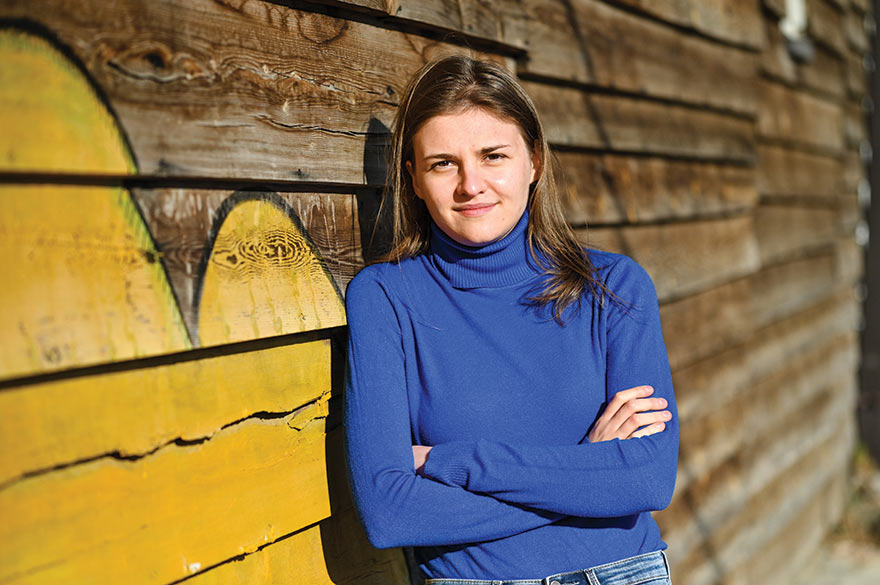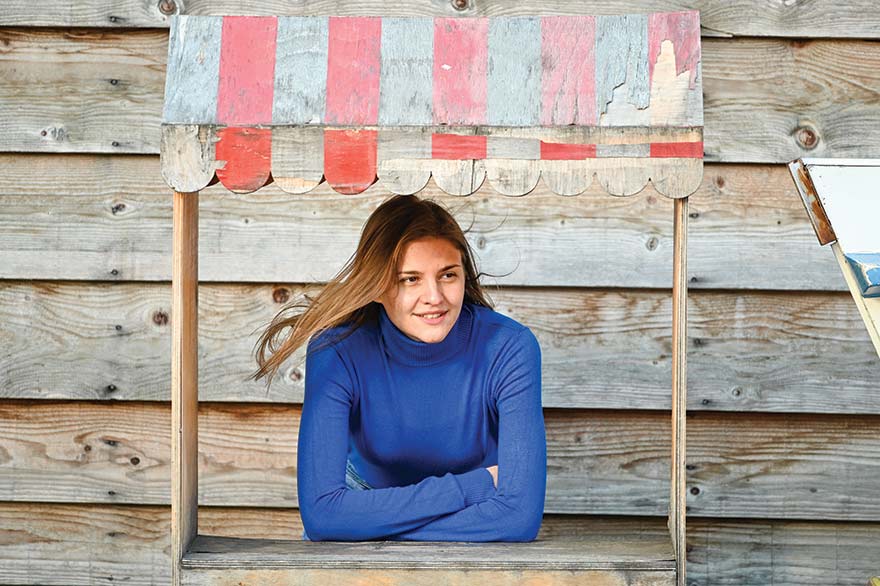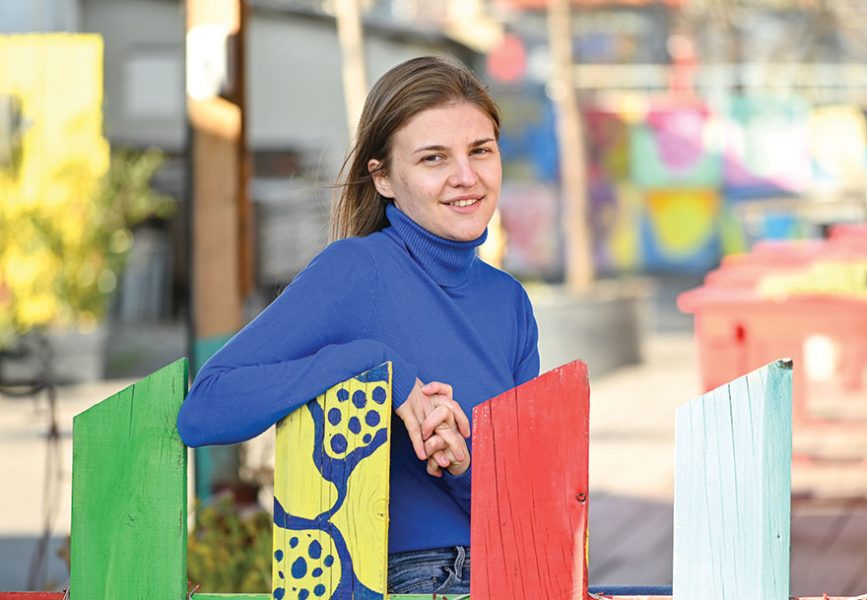She was a child who desired success, and her teacher kept telling her ‘we’ll see how long you’ll stick it out’. Everything that she does is motivated by a desire not to betray that little girl who believed that, somewhere far away, a better and safer world exists where she will live as a happy, successful and independent woman. Radmila Petrović (24) is today a qualified economist and poet who finds herself in the public spotlight
It’s difficult to recall a poet who so ferociously barged onto the literary scene of a country like Radmila did in Serbia in 2020 with her collection of poems “My Mum Knows What’s Happening in Cities”. She previously published her collections “The Scent of Earth” and “Cellulose Rock ‘n’ Roll” as competition winning works. When you hear the verse “I’m a charmer-girl, I have a penknife in my pocket and a wire in my bra” you naturally think of a modern Calamity Jane, one who informs you so convincingly:
“There where I grew up
tenderness is not shown towards people,
it is kept
for kittens born in a barn.
there you learn some tricks,
then you go far
and seek a man who doesn’t fall for them.”
A broader circle of readers will find Radmila’s poem “I’m a Serb, but Kosovo isn’t in my heart, rather you are” particularly attractive . That’s primarily because of the unique opposition of the life force of Eros, with which the culture of death will be rendered meaningless. And thus the poetess will say:
One woman in love
is more dangerous than a NATO tank…
with regard to the Kosovo issue
general peonies bloom in my knickers”.
Critics say that her poetry undoubtedly shifts boundaries “in the recent poetic production of the Shtokavian language, they show that poetry is still capable of shifting worlds, at least those small, internal ones. Strength and courage, but also the skill of articulating the poetic language with Radmila Petrović testify to a sanctified liberation, which is seeking its own place under the sun. It seems that in this case, when it comes to literature, that place has been found.”
Who is Radmila Petrović, other than a graduate economist?
She was born in 1996 in the city of Užice, because that’s the location of the nearest maternity hospital to the village of Stupčevići near Arilje, where she grew up. She completed Jezdimir Tripković Primary School in Latvica (village near Arilje) and St. Sava Gymnasium High School in Požega, then graduated from the University of Belgrade Faculty of Economics, where she is currently completing her master’s studies. She graduated from the Faculty of Economics with an average grade of 9.8.

She grew up in a rural area and on a daily basis repeatedly told herself that she had to study and move away, if she’s clever, in order to avoid suffering like her parents. She was taught implicitly that life is difficult and that there aren’t many choices. She also acquired what would be referred to as a good domestic upbringing, which implies a cordial attitude towards guests and people generally.
Everyone in her surroundings worked in farming, and the first time she saw people who weren’t farmers was in a Spanish soap opera. They were some businesspeople, and she began dreaming about becoming an economist and running a business. That led her to enrol in economics, and today she works at a small company that deals with consulting and the introduction and implementation of a type of ERP software.
My relatives constantly made comments about how clever and capable I am, and how unfortunate it is that I’m not a boy
You’ve said you were born in the village as a woman again! That’s humorous for the reader, but how was it for you?
In the countryside, having a male child is a matter of pride. I discovered when I was little that my parents desperately craved a son, and that my mother cried in the maternity ward when they told her I was female. My granddad and my dad were both disappointed. I really studied and tried hard for myself, but I had the constant impression that, regardless of how much I was always the best in my class, all they wanted was a son who wouldn’t even have to try in anything – would receive it all on a platter. My relatives also constantly made comments about how clever and capable I am, and how unfortunate it is that I’m not a boy. And that might now be funny for some, but the feeling isn’t very nice at all when you’re a little girl who just wants to be loved the way you were born, without comments about how great it would be if you were something that you definitely aren’t and cannot become.
How difficult is it to be a woman in rural Serbia today?
It’s still difficult to be a woman, especially in rural areas. You can’t be a lady there. The work is physically demanding, the skin burns and peels off several times during the year, fingernails crack and clothes smell like livestock. Fruit must be picked, animals fed, lunch prepared, no one will ask you if you’ve perhaps just got your period.

Women are mostly housewives, working in the house and in the fields using simple tools, because those more complex tools are reserved for men. And if, God forbid, something happens to their spouse, they are left to the mercy of neighbours and relatives, without a trade with which to educate their children. Many women stay in abusive marriages with wife beaters precisely because of their material dependence. Many take on casual work in their later years in order to provide for the most basic living conditions. And those aren’t just women – no farmer receives a pension for all those years of hard work. In my village women aren’t members of any committee and no meetings are attended by women.
Did you enrol in economics and complete your studies because you needed to have a secure occupation in your hands?
I dreamt of being a businesswoman. I saw that in a Spanish soap opera. As a child I did not know anyone who was engaged in anything other than farming. I didn’t know anything about the arts; I didn’t know that you could be a playwright, a director or a photographer, that some people make a living from that. When you grow up in small communities you don’t know the possible range of professions you can pursue. As a result, it can happen that you only realise what you were actually meant to study at the age of 25 or 35.
In recent months everyone has been confronting me with questions like: are you a sincere poet and an insincere economist? I won’t lie: there is something in that question that scares me. I don’t think I’m anything insincerely, or at least I wouldn’t want to be. I’m currently engaged in what I studied, I want to see how much economics can give me and how much I can give it. Apart from that, I read and write every day in order to work on my “talent” for writing.
That’s all I can do right now. On the other hand, I don’t have any secret skills I could use to raise money for rent and other things. Nobody pays if you write a poem. I’m slowly reviewing all the possible options, I want to try my hand at many more things. When it comes to what I will do for a living, you need to be brave and open enough and to say: who knows?!
In my village women aren’t members of any committee and no meetings are attended by women
Is there anything you hated in the village?
Mostly the way men treat women, or the majority of them. The law of the wilderness reigns in the village, the law of the stronger. And everyone minds their own business only when they need to report that a neighbour is beating his wife. I also don’t like the kind of thinking that’s bothered about what the village will say; that life that you determine according to the expectations of your surroundings. Competing over whose sow will weigh the most. The feeling that you’re fighting an invisible enemy (the neighbourhood) and that you always have to be better than him so that won’t rejoice over your sadness and shame.
What did you learn in the village that you need for your life today and tomorrow?
In the home they spoke about why some families “disappear”, I think that discovery that “everything comes back to you” always kept me far from the thought of causing anyone harm. I learnt that life is merciless and that if you don’t help yourself then no one else will. I learnt to fight. I promised myself that I wouldn’t allow anyone else to manage my life.
I was a child who desired success, and the teacher kept saying that we’ll see how long I’ll stick it out. Everything I do, I do in order not to betray that little girl who believed that, somewhere far away, a better and safer world exists where she will live as a happy, successful and independent woman.
What did your initial encounters with literature and poetry look like? Which writers and poets did you like first and why?
That was back when I was 16 or 17. I read a poem by Miodrag Pavlović from my sister’s textbook and was delighted. There was no rhyming in it and that surprised me. There weren’t any big words or events either. I didn’t even understand precisely what that poem was about. I just liked something about it. It was as though poetry had found its own way to me. It was as though poetry had come to cheer me up, and it succeeded in that. Nothing has brought me as much happiness as poetry. I’m not just talking about how I feel while reading, but also about the situations I’ve found myself in thanks to it and the people I’ve met, and who finally understood my language, and I theirs.
I first read those most famous poets, like Miljković, Neruda, Yesenin. I think I fell in love with poetry because it was there that I found emotions that no one in my environment had expressed in that, or expressed at all.

Which writers and poets are you discovering today?
I’m discovering many, both those that are not yet known and those that it’s “shameful” not to know.
What’s the greatest compliment or accolade you’ve ever received for your poetry?
The greatest accolade is the people who approach me and say that they’ve read my collection several times and that it has in some way comforted, encouraged or made them laugh. You know, that one thing in my life wasn’t in vain and that’s a wonderful feeling.
How do your parents comment on your poems?
My parents generally don’t make any comments related to my poems in front of me.
I heard that my Dad said to my uncle: Radmila wrote both about what she should have and what she shouldn’t have.
What would I say to that, except that I didn’t write poems for my parents or relatives? I talk to them in prose and we’ve already told each other what we needed to.
My parents and relatives have certainly supported the policy of maintaining silence all their lives.
I think differently; I think that nothing will ever change if we all remain silent.
It’s difficult to be young, particularly if one’s environment creates the impression that everyone is doing great and you’re the only one with some minor or major problems, discoveries and considerations
When someone says ‘a good life’, what does that mean to you?
To me that means living in peace (of the soul), with family and friends, pure of heart and cheek, with the minimum materials to exist secured. It is hypocritical to say that economic resources aren’t important. Around the world 25,000 people die of hunger every day. I know children who’ve never overcome the humiliation they received at school, and that humiliating was based purely on material things, or what they lacked. You have to have some level of resources in order for that to become irrelevant to you.
A good life, to me, also implies a life in which you accept challenges and do things that you previously wanted to do but weren’t able to do for some reason. And a life in which you are constantly learning something new.
COVID-19 has been the most common topic in our lives in recent months. How much has the story of this virus been present in your life, how afraid are you, how much has your life changed and narrowed as a result of the pandemic?
I’m afraid because I had asthma, and probably still do, though I don’t use an inhaler pump and don’t have any problems. I feel sorry for the people who passed away and their families.
In such a situation as this I try to organise my day as best I can. I say to myself: okay, don’t think about the future, what can you do today? That gap between wishes and possibilities has further widened for all of us. I generally deal with it well because it’s not as though I’m really used to everything in my life being made to measure.
Take care of yourself and others, learn something new, watch good films, read beautiful books, exercise in your homes. Discipline awakens hope.
Do you have any desires that you can talk about?
I want us all to be healthy and not so hypocritical. For us not to lie about how perfect we are at work and not lie about how we live perfectly and have lived perfectly. I want that because of young people, because it’s difficult to be young, particularly if one’s environment creates the impression that everyone is doing great and you’re the only one with some minor or major problems, discoveries and considerations. I want everyone to find what causes their sadness and where their happiness is. My happiness can also be in helping other people, at least by saying what someone needed to tell me at some point.